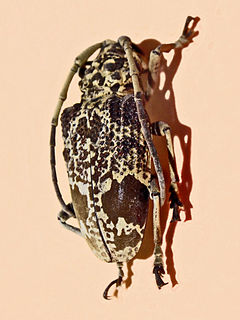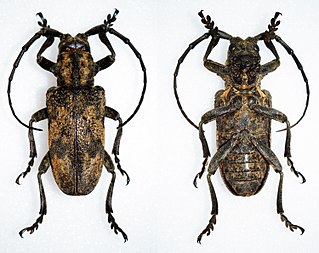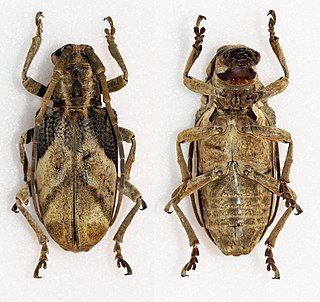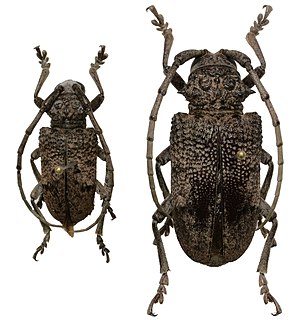
Acacia leprosa, also known as cinnamon wattle, is an acacia native to Australia. It occurs in woodland in New South Wales and Victoria. It occurs as a hardy shrub or small tree. The phyllodes are 3–14 cm long and contain oil glands. The lemon-yellow flowers occur as globular heads in clusters in the leaf axils. The fruit is flat seed pod.

Pseudoeurycea leprosa is a species of salamander in the family Plethodontidae, endemic to Mexico.

Mauremys is a genus of turtles in the family Geoemydidae.
Canariella leprosa is a species of small air-breathing land snails, terrestrial pulmonate gastropod mollusks in the family Canariellidae, the hairy snails and their allies. This species is endemic to Spain.

Hypodoxa is a genus of moths in the family Geometridae described by Prout in 1912.

Acacia 'Scarlet Blaze' is a cultivar of Acacia leprosa originating from Victoria in Australia. It is noted for its unusual red flowers.

The Spanish pond turtle, also known as the Mediterranean pond turtle or Mediterranean turtle, is a species of turtle in the family Geoemydidae. The species is endemic to southwestern Europe and northwestern Africa.
Hypodoxa leprosa is a moth of the family Geometridae first described by William Warren in 1907. It is found on New Guinea.

Phryneta is a genus of flat-faced longhorn beetles belonging to the family Cerambycidae.

Phrynetini is a tribe of longhorn beetles of the subfamily Lamiinae. It was described by Thomson in 1864.

Phryneta aurocincta is a species of beetle in the family Cerambycidae. It was described by Félix Édouard Guérin-Méneville in 1832, originally under the genus Lamia. It has a wide distribution throughout Africa.
Phryneta coeca is a species of beetle in the family Cerambycidae. It was described by Chevrolat in 1857. It is known from Tanzania, the Central African Republic, the Ivory Coast, Cameroon, the Democratic Republic of the Congo, and Togo.
Phryneta conradti is a species of beetle in the family Cerambycidae. It was described by Hermann Julius Kolbe in 1894. It is known from the Democratic Republic of the Congo, Tanzania and Malawi.
Phryneta ellioti is a species of beetle in the family Cerambycidae. It was described by Charles Joseph Gahan in 1909. It is known from Uganda and the Democratic Republic of the Congo.
Phryneta ephippiata is a species of beetle in the family Cerambycidae. It was described by Francis Polkinghorne Pascoe in 1864. It is known from South Africa and Namibia.

Phryneta obesa is a species of beetle in the family Cerambycidae. It was described by Westwood in 1845. It has a wide distribution in Africa.

Phryneta semirasa is a species of beetle in the family Cerambycidae. It was described by Dohrn in 1885. It is known from Tanzania, the Democratic Republic of the Congo, Mozambique, Zimbabwe, Malawi, and Zambia.

The Fig-tree Borer Longhorn Beetle, or Fig Tree Borer, is a species of beetle in the family Cerambycidae. It was described by Johan Christian Fabricius in 1792, originally under the genus Lamia. It has a wide distribution throughout Africa. It feeds on Pyrus communis, Ficus carica, Salix babylonica, Cupressus sempervirens, and Vitis vinifera.

Phryneta verrucosa is a species of beetle in the family Cerambycidae. It was described by Dru Drury in 1773, originally under the genus Cerambyx. It is known from Equatorial Guinea, and was introduced into Barbados, Grenada, and Trinidad and Tobago.
Veprichlamys is a genus of scallops in the family Pectinidae. This genus contains 8 extant species and one extinct species.












